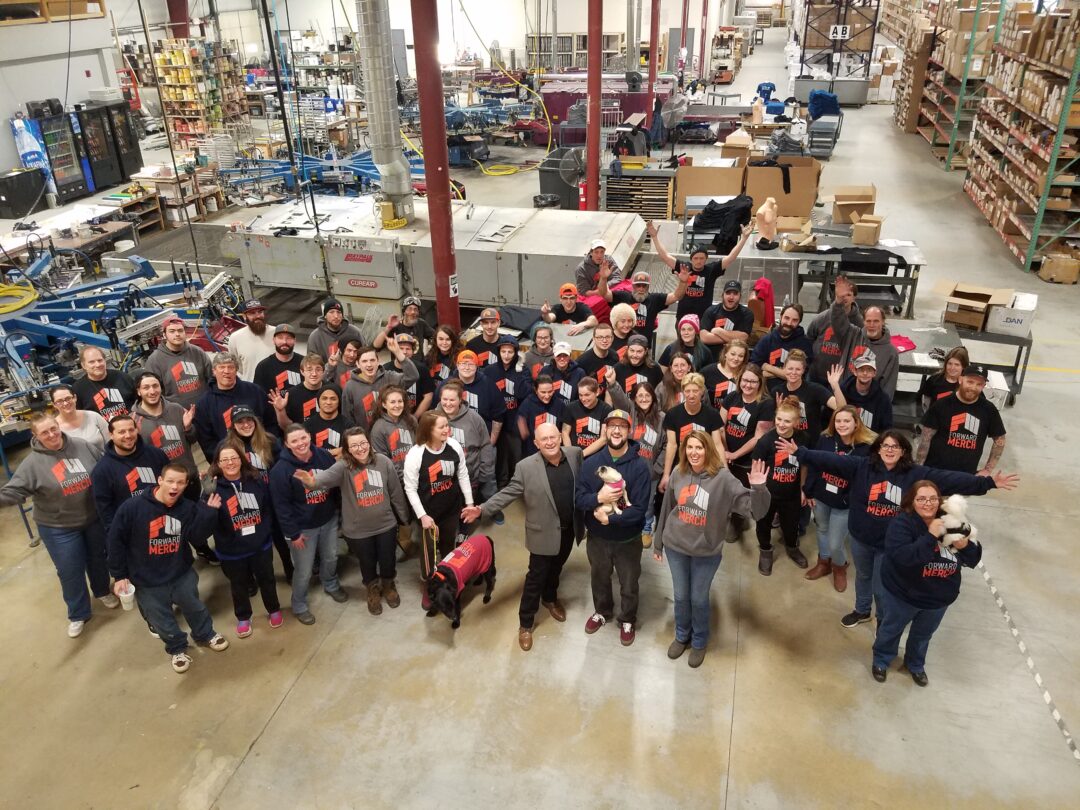Forward Merch: ‘We are creatively evolving our e-commerce platforms–the show must go on.’
In our Your Story series, we speak to business owners about the challenges they’re facing and the steps they’re taking to overcome them. CFO Tiffini Masessa shares how Forward Merch is pivoting with a new community project and product app. I have been at the company since 1996. Although I started my career on a bank’s junior […]

In our Your Story series, we speak to business owners about the challenges they’re facing and the steps they’re taking to overcome them. CFO Tiffini Masessa shares how Forward Merch is pivoting with a new community project and product app.
I have been at the company since 1996. Although I started my career on a bank’s junior management program, it was one of my clients, Jeff Riccio, who introduced me to music merchandising and offered me a job.
It certainly sounded a lot more exciting than what I was doing at the time, so I took the leap, learned every facet of the business, and was promoted to oversee our production and fulfillment facility before earning the title of owner and business partner two decades later.
Forward Merch is a fulfillment company for JSR Merchandising, which focuses on merchandise related to rock music. With the added partnership with Creative Goods, we now also handle merchandise for Broadway shows such as Hamilton, artists like Pink Floyd, and the opera singer Andrea Bocelli.
We have a 45,000 square foot facility in Dover, New Hampshire to create, manufacture, and distribute products, housing an art and design department with screen printing presses and embroidery machines, and a warehouse to pick, package and ship orders for tour supply, brick and mortar stores, or online.

Before coronavirus hit, we were slated to have one of our biggest years ever–we were on a trajectory of unprecedented growth due to the number of clients and events on our books. And then, everything was cancelled.
But like they say in the business, we have somehow found a way for the show to go on. It is undoubtedly tough, but pivoting is possible with creativity.
Typically, even in a recession our business continued to do well because in the US economy, people still crave entertainment. Even in a downturn, the public continues to attend concerts.
Unfortunately, there is no such saving grace at a time of coronavirus.
We have ended up with a lot of cancelled in-house orders and inventory that is going nowhere. Although we do mail order and retail fulfillment, that is a small part of our business and up to 85% is about selling products for live events. It undoubtedly changed things for us and, as a result, we had to put a lot of people on furlough; we just didn’t have the work.
It’s a tough period. But instead of feeling sorry for ourselves, we decided to try and help the community. We created the Seacoast Support Community Project as a simple way for people to represent and show solidarity for their local businesses.
We built a website where Seacoast businesses can design shirts with their logo and sell them for $19 to help them with coronavirus costs. $10 goes to the company, and $9 covers the time of our art and finance departments working from home and the printing costs.
We have also found a new revenue stream in creating branded masks with band logos, and these are big sellers. We are trying our best to rebuild, even though things are a lot slower. We are in survival mode, but if we hang on, we will make it to the other side, I know it.
When coronavirus subsides, I console myself and our team with the idea that there will be a lot of opportunity for growth, because people will be clamoring to get out for entertainment.
Switch to a user-friendly e-commerce platform
To anticipate a post-corona entertainment boom, we are thinking about our e-commerce situation. When theaters and live venues start to open, organizers will not want crowds to congregate around merchandise tables traditionally, so what are our options?
Fortunately, we always focused on e-commerce because it’s something that our customers wanted regardless. Before coronavirus hit, we provided e-commerce as part of our fulfillment package. At the end of a tour, for example, this provided an outlet for clients to sell tour returns and leftovers.
E-commerce has always been a part of our business, but coronavirus has changed how we view it.
We have switched platforms from Magento to Shopify in the middle of coronavirus because it lets us get products to customers more quickly and simply–anyone can use it rather than always needing an expert on hand.
We are also developing apps where those attending a show can buy merchandise from their phone, which in turn alerts the merchandisers at the shows to ready their order, before having the customers pick up at their convenience at a safe social distance.
Stagger staff levels when re-opening the business and protect a positive mindset
Until events start happening and we can begin planning for tours again, the hard truth is that we are not going to be able to bring everybody back from furlough.
However, our goal is to bring everybody back as soon as possible. Because our people make our business–our people put their pride and joy into every t-shirt and piece of merchandise they make.
As the close order for the state of New Hampshire ended on May 4, we have been able to partially re-open, working Monday through Thursday with a partial staff. This has given us some much-needed encouragement.
We have safety protocols in place, important for people who are usually working closely together. We have rearranged manufacturing and everybody stays six feet apart. That has been a challenge, and like everybody else, we have been looking for the sanitizing wipes and cleaning products to keep the facilities as clean as possible. We want to make it a safe and productive environment.
We acted quickly and took advantage of a Paycheck Protection Program (PPP) loan, which has helped sustain us and kept employees employed. We are also waiting on a Small Business Administration (SBA) loan because this will help us get restarted with suppliers, vendors, and customers.
Although we are a successful business, the money dries up quickly when you have a warehouse full of cancelled orders that customers can’t pay for.
It is going to be a slow rebuild–and so we must protect a strong mentality and keep a positive outlook to get through it.
Broadway, which is a big part of our merchandising business, is a coronavirus hotspot and will open up later than other states. Luckily, there are shows in countries like England and Australia, as well as touring shows, which will pick up quicker.
While it looks like it will be a long haul to get back to where we were–a year of rebuilding in my estimation for our industry–we have decided that our mentality is to move forward and explore every new possibility that we can.
My top takeaways
Here’s what worked best for our business
- Take advantage of any support available
Being quick to respond and apply to programs like the PPP helped keep us going and keep employees on in the absence of any revenue. The SBA loan will help us get restarted. Consult the business community for advice on what you are entitled to, and lean on each other to navigate the small print. - Update your e-commerce platform
Going forward, businesses must pay more attention to e-commerce, making it more robust, and ensuring that products are efficiently dispatched to wholesale and retail stores. This is the time to upskill your team in improving the online operation–the bulk of our profit was coming from tour sales, but we are taking steps to flip that balance with better technology. - Diversify your product and services, and don’t forget about marketing
It pays dividends to be a highly specialized business with a niche, captive audience but expanding your business with products and services that can be adapted mass-market is a way to future-proof revenues. This also means that you might need to spend more money on marketing than you have done historically, but take advantage of online tutorials and social media to support these efforts cost-effectively.
Tiffini spoke with Sage Advice’s Ashley Hindsman.





